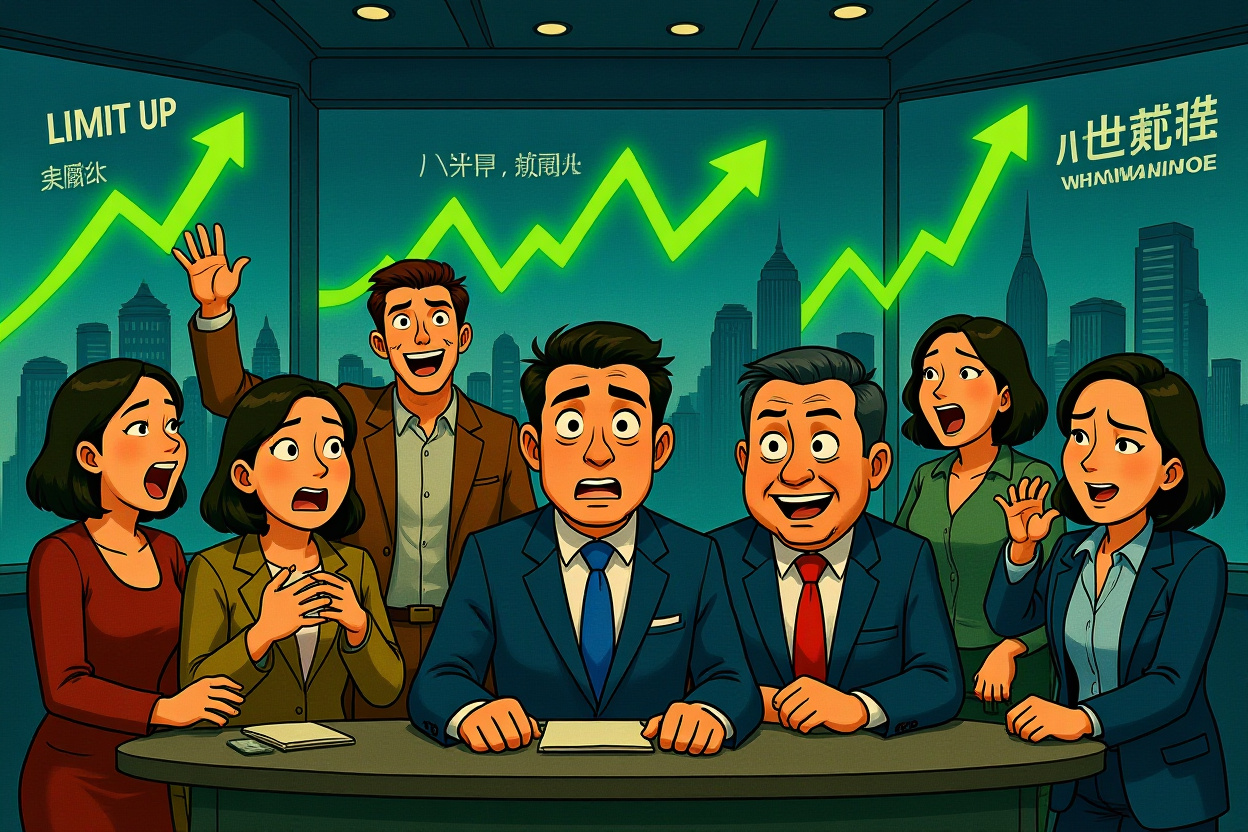Executive Summary
Beijing Capital Development (首开股份) has captured market attention with an unprecedented rally despite poor fundamentals. Here are the critical takeaways:
- Loss-making property stock surged 152.65% over 10 trading days with 9 consecutive limit-up moves
- Price movement triggered Shanghai Stock Exchange’s “severe abnormal fluctuation” designation
- Rally attributed to indirect 0.3% stake in robotics firm Unitree Tech (宇树科技) through subsidiary
- Company maintains no undisclosed material information exists behind price movement
- Experts warn of significant correction risk once robotics hype subsides
The Unlikely Rally Defying Fundamentals
In a remarkable display of market speculation, Beijing Capital Development Co., Ltd. (首开股份, 600376.SH) has transformed from a struggling property developer into China’s latest market sensation. The stock recorded nine consecutive daily limit-up gains between September 3-12, 2025, accumulating a staggering 152.65% price increase despite reporting substantial losses in its core business operations.
The Shanghai Stock Exchange (上海证券交易所) officially designated the stock as experiencing “severe abnormal fluctuation” according to its trading rules, placing Beijing Capital Development on its watchlist from September 15-26, 2025. This designation indicates price movements have significantly diverged from both company fundamentals and broader market trends.
Price Action Versus Financial Reality
At closing on September 16, Beijing Capital Development’s stock price reached 6.67 yuan per share, giving the company a market valuation of 17.21 billion yuan. This valuation appears particularly disconnected from financial reality when considering the company reported a net loss of 1.84 billion yuan attributable to shareholders on 18.04 billion yuan in revenue for the first half of 2025.
The company confirmed in exchange filings that no material undisclosed information exists that would justify this price movement, specifically noting no major asset restructuring, share issuance, or significant transactional activities are underway. Insiders including directors, supervisors, senior management, and controlling shareholders haven’t engaged in recent stock transactions either.
The Robotics Connection: Minimal Stake, Maximum Impact
The catalyst behind this extraordinary demon stock rally appears connected to Beijing Capital Development’s minimal exposure to the red-hot robotics sector through subsidiary Beijing Capital Development Yingxin Investment Management Co., Ltd. (盈信公司). This 62.74%-owned subsidiary indirectly holds a stake in Hangzhou Unitree Technology Co., Ltd. (杭州宇树科技股份有限公司), a prominent robotics company rumored to be pursuing an initial public offering.
Breaking Down the Ownership Structure
According to company disclosures, Yingxin Company has committed 300 million yuan to Jinshi Growth Equity Investment Partnership, with 180 million yuan already paid in. As of August 25, 2025, Yingxin holds approximately 6.51% of this fund, which in turn owns 4.7683% of Unitree Technology.
This creates an extremely diluted ownership chain: Beijing Capital Development → Yingxin Company (62.74%) → Jinshi Growth Fund (6.51%) → Unitree Technology (4.7683%). The ultimate economic interest amounts to approximately 0.3% of Unitree Technology, which the company characterizes as a purely financial investment without control or influence over fund decisions.
Expert Analysis: Anatomy of a Demon Stock Rally
Bai Wenxi (柏文喜), Deputy Chairman of the China Enterprise Capital Union, identified three key factors driving this demon stock rally. First, the scarcity of A-share companies with direct exposure to Unitree Technology made Beijing Capital Development one of the few available investment vehicles for speculators seeking robotics exposure.
Second, the stock’s prolonged trading below net asset value combined with a moderate float made it particularly susceptible to momentum trading and speculative pushes. Third, the overall market enthusiasm for robotics stocks, amplified by Unitree’s anticipated IPO, created perfect conditions for this dramatic price movement.
Institutional Activity and Warning Signs
Beijing Capital Development itself acknowledged concerning trading patterns in recent disclosures, noting significantly increased trading volume, dramatically higher turnover rates, substantial growth in shareholder numbers, and some institutional investors completely exiting their positions through减持 (reduction) and清仓 (complete liquidation) activities.
The company explicitly warned investors about the rapid price appreciation and potential for sharp declines, particularly if the robotics hype subsides or Unitree’s IPO faces delays. This demon stock rally exemplifies how tenuous connections to popular sectors can create disproportionate market movements in China’s equity markets.
Regulatory Context and Market Implications
The Shanghai Stock Exchange’s decision to place Beijing Capital Development on its abnormal fluctuations watchlist reflects growing regulatory attention to speculative trading patterns. Chinese regulators have increasingly monitored so-called “demon stocks” (妖股) that exhibit extreme volatility disconnected from fundamentals.
This case demonstrates how sector rotation into favored themes like robotics and artificial intelligence can create valuation dislocations, particularly when investors crowd into limited available options. The demon stock rally surrounding Beijing Capital Development highlights both the enthusiasm for technological innovation and the potential for speculative excess in Chinese markets.
Historical Precedents and Pattern Recognition
Similar patterns have emerged previously in Chinese markets, where companies with minimal connections to hot sectors experienced dramatic rallies. Previous examples include pharmaceutical, blockchain, and new energy vehicle-related stocks that saw spectacular runs followed by sharp corrections once speculation cooled.
These patterns typically feature retail investor enthusiasm driven by social media amplification and momentum trading, often with professional investors taking profits during the rally. The current demon stock rally follows this established pattern, though the robotics theme represents a newer investment narrative.
Investment Implications and Risk Assessment
For institutional investors and sophisticated market participants, Beijing Capital Development’s price movement offers several important lessons. First, it demonstrates the continued power of thematic investing in Chinese markets, where narrative can temporarily overwhelm fundamental analysis.
Second, it highlights the importance of understanding complex ownership structures and accurately calculating economic exposure rather than simply buying companies associated with popular themes. The 0.3% effective ownership stake in Unitree Technology provides negligible fundamental value despite its dramatic market impact.
Portfolio Considerations and Position Sizing
Professional investors should consider appropriate position sizing when engaging with thematic investments, particularly those with speculative characteristics. The demon stock rally phenomenon reminds us that extreme volatility works in both directions, and stocks that rise rapidly on speculation often fall even faster when sentiment shifts.
Risk management becomes particularly important when investing in companies experiencing such dramatic moves. Setting strict loss limits and maintaining disciplined position sizes can help professional investors participate in thematic opportunities while protecting against catastrophic losses if speculation reverses abruptly.
Looking Ahead: Sustainable Value or Speculative Bubble?
The critical question for market participants is whether Beijing Capital Development’s dramatic price movement represents sustainable value creation or purely speculative excess. The company’s core property business continues facing significant headwinds from China’s real estate sector challenges, with substantial losses reported in recent periods.
The minimal robotics exposure through subsidiary investments provides negligible earnings contribution or strategic value at current levels. This suggests the demon stock rally likely represents speculative enthusiasm rather than fundamental improvement, creating significant risk for investors entering at elevated levels.
Market professionals should monitor several key developments: Unitree Technology’s IPO progress, regulatory responses to excessive speculation, and broader robotics sector sentiment. Any deterioration in these supporting factors could trigger rapid valuation reassessment for Beijing Capital Development and similar theme-connected stocks.
Ultimately, this episode reinforces the importance of disciplined fundamental analysis even amidst market excitement about emerging technologies. The demon stock rally phenomenon reminds us that while narratives can drive short-term price movements, long-term value creation requires sustainable business fundamentals and reasonable valuation parameters.



